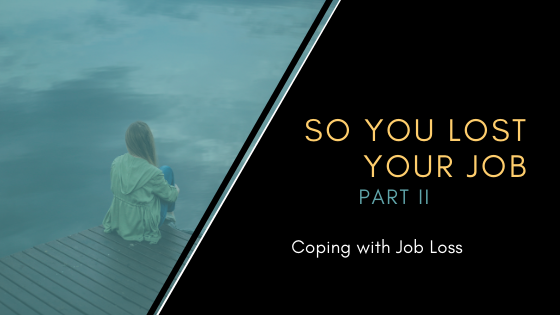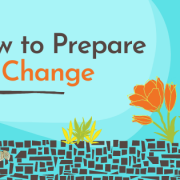So You Lost Your Job, Part 2: Coping with Job Loss
Career Tip Leaving Your Job
You may have a string of thoughts going through your head right after and for days or weeks after you’re laid off.
Why was I let go?
Why didn’t X get let go?
What am I going to do now?
What do I tell my family?
What a relief to finally know.
Oh well, that’s life!
This is my boss’s fault.
It’s all my fault!
It’s the pandemic’s fault.
And you are justified to think every one of those thoughts. But if you quickly sort out the helpful from the detrimental, you’ll be better off in the short and long run.
How to get through this job loss starts first with you—not job sites, not networking, not resumes. You and your thoughts.
Pause for a moment
Some people want to take immediate action. If you’re one of these people, you might be tempted to leave the office thinking, “I need to get a job now!” And you’ll head home, open up your resume, and start combing through your LinkedIn contacts.
I challenge you to pause for a couple of days for several reasons, the first being that your brain is not in its tip-top shape at the moment. Even if you’re partially relieved at the news, even if you knew it was coming, losing your job derails you. In moments like these, you lose your ability to judge and complete complex and relationship-based tasks. Even if things are tight right now, you might do something foolish that will set you back. So give yourself a little break.
Plus, taking a break and stepping back will allow you to reflect—the number one thing you need to succeed in life: reflection. Sitting with your thoughts and feelings without judgment.
Put your layoff in context
While you can let negative thoughts occupy most of the space in your mind for the first couple of days, the longer you think them, the more you risk actualizing them. Of course, negative thoughts will pop up over the next few months. When they enter your mind, try not to indulge them, but you also don’t have to get rid of them immediately. Rather, read them as a sign for what’s actually going on right now, whether externally or inside yourself. Once you can read your feelings as a sign of something, then you know what action to take.
Take Cheryl for example: she has been feeling down about herself and often thinks, “Of course they fired me (see this post on wording), I’m a bad employee. They didn’t fire Taylor, they fired me.”
If Cheryl observes these feelings instead of feeling them, she’ll see the root issue: that her self-esteem and self-worth are lacking at the moment. Now she has a new immediate goal: boosting these. She can do this by taking 10 minutes and writing out only things she did well, either at work, home, for herself, or for others. She’ll come up with examples of how she was good at her job, task, or whatever. (She’d also benefit from filling out prompt #2 below!)
Talk it out
You have two options to avoid the internal spirals: talk to someone and write it out.
Talk with your people: family, friends, coworkers. Share in relation to the closeness between you two (aka, don’t overshare to people who just aren’t that close). Talking about your problems and solutions is great for multiple reasons:
- You’ll get out of your head.
- You’ll follow different trains of thought when talking to someone.
- You’ll include people who are worried about you.
- Your friends are far nicer to you than you are to yourself. Plus, they’re more removed and thus more level-headed about the situation right now.
- Your people will know where you are in the process and can help accordingly, such as lending a helpful ear or keeping an eye out for any jobs or leads.
A note specifically for 2020 to 2021 readers: A layoff can feel especially lonely nowadays, with all the social distancing and self-isolating. It is easier than ever to hide away. And with all the world’s problems right now, it can feel selfish to complain about your situation—someone always has it worse. But that’s not really how the world works, is it? You still have your problems even if someone else has theirs. Talking about it with friends and loved ones will help release the feelings of isolation and self-pity.
Include your family and household members. Keep them up to date, and ask for input. Job losses don’t just affect the person who lost their job. People really do want to hear from you. Uncertainty hangs in the air around a job loss; there’s no need to add to that by keeping people in the dark. This extends to friends as well. Heck, tell strangers. You never know who will have words of wisdom or—better yet—a connection to your new job.
Write it out
There is a downside to talking with people. Eventually you’ll be repeating yourself, or the other person—even though they still love you and care about you—will lose the ability to listen. It’s not that you’re annoying them; there’s just a limit to talking about your situation. That’s where writing comes in.
Notice that in the previous section, the solution for Cheryl was to sit down and write something out? Writing is going to be your best friend during this tough time. Staying in your head is the worst thing you can do. Humans are great at finding faults, and it’s our natural go-to activity in our minds. But that’s not going to help you right now.
The benefits of writing are manifold:
- You can write almost any time, any place.
- You’d be hard pressed to write “too much.”
- You always have an audience—paper or screen.
- There’s no judgment over what you write. No one else is going to read it.
- You can come back to what you wrote down. Reviewing where you’ve come from and where you’ve wanted to go is an important part of the process.
Try these writing prompts
Paper, screen, keyboard—the form doesn’t really matter. What matters is that you’re honest with yourself. Here are some prompts to use:
- List all your worries, fears, feelings, reactions, etc.—no matter how rational or irrational. You can create a list. You can do a free write (nonstop writing where you don’t edit yourself). You can write a letter to yourself, your boss, your community, whoever (but don’t send it). Getting whatever thoughts you’re stuck on out of your head and onto paper will help.
- List all the reasons why you were let go that were beyond your control: pandemic, world, economy, industry, management, bad luck, etc.
- Explore reasons why you were let go that were under your control. Notice I don’t say why it was your fault. The point of the exercise is different from the last one. Even if you were part of a mass layoff, which is not personal, it can still feel personal. This way, by truly reflecting on yourself, you can regain your self-confidence and gain an idea of what to change in the future.
- Make a list of what you’ve learned from this whole situation or experience. Create some takeaways, either helpful facts or calls to action.
I want to point out the order of these prompts. Of course, you don’t have to do all of them or in this order. But if you follow this order, you’d start from a place of emotion, then look at outside objective facts, then internal facts, and finally create a support system and action plan.
Remember, you are not your job
Losing your job can feel like losing a part of yourself. You spent a third of your time at the company, giving it your all, caring so much about your team, your boss, and your performance. It’s easy to identify with your title, your employer, or your work.
Most people will lose their job one way or another. And people will have an average of 12 jobs in their life, according to the US Bureau of Labor Statistics. So there’s no reason to hold onto your job title as your identity anyway. Things will change.
As Bradley Richardson wrote in Career Comeback, “Your true identity is not a singular one, but rather multiple identities based on the roles you play at a given time and in a given situation.” He goes on to suggest, “If one role presents a challenge or is altered (your career in this case), then leaning on the other roles and areas in your life … can support and buoy confidence.”
Find your other people and passions right now. Identify what you can lean on and embrace it right now.
If you haven’t checked them out already, I go over what you should do immediately after being let go and where you should go next.

I’m Stacey Lane: Career Coach | Transition & Career Strategist | Personal Brand Specialist
I help individuals with unique backgrounds find their perfect fit and effectively market themselves so they find work that is as interesting as they are.
Contact me to get started!



